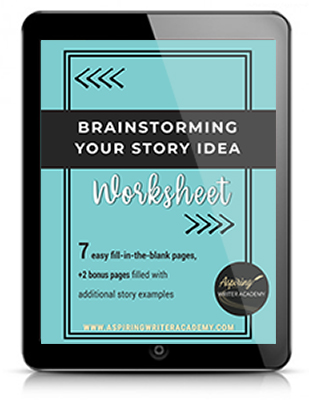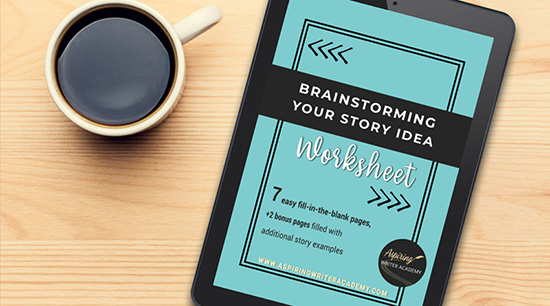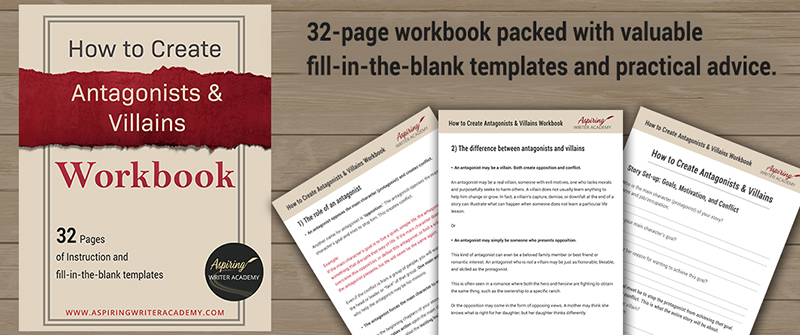How to Create a Fictional Character in 5 Steps

If you are just starting to write a novel, you may have come across character questionnaires to help you brainstorm basic information for your story cast, but how do you truly flesh out your characters on a deeper level? How do you make your characters jump off the page and feel “real?”
In How to Create a Fictional Character in 5 Steps, we give you more than just the average list of questions to think about so that you can create characters your readers will love.
Follow along as we discuss:
- Childhood Relations
- Social Influences
- Backstory Wound
- Career Choices
- Personal Preferences
When I started writing my first novel, I created characters haphazardly without any correlation between their strengths and weaknesses to their personality or their background. I would fill out character questionnaires and simply choose what seemed like a good skill or habit for my characters to have without considering how this might impact the plot.
I chose whatever car I thought might be cool for my character to drive and put him in a house I liked. I randomly chose his preferences for food and music and friends without giving it another thought.
Did it matter?
Once I took more classes and studied the craft of writing further, I realized that everything about your character should be interconnected and relate to his background, his upbringing, his personality, his past wounds, and the journey he is about to embark upon in the present story.
This creates a character whom your reader can identify with and understand. Compelling characters are the heart of a story your readers cannot put down.
In the post below, we will show you How to Create a Fictional Character in 5 Steps.
How do you create a fictional character?
Create a fictional character for your novel by selecting their relationships, background, culture, education, past trauma, career, and consider how these factors may influence their personal preferences and dictate how they react to specific situations.
1) Childhood Relations
Family is the biggest influence upon a child when he or she is growing up.
- Who influenced your character when he or she was a child?
- Who was in their family circle?
- Did your character have a favorite family member?
- Who do they most admire and why?
- Did anyone act as a mentor?
- Who did your character shy away from or avoid? Why?
- Does your character have aunts or uncles or grandparents?
- How does each family member impact your character?
The character’s birth order within the family may also influence his or her personality. Sometimes the eldest shoulders the most responsibility, the middle child feels insignificant, and the youngest gains the attention by being the comedian of the family. You can Google “birth order” online for more ideas on how it may affect your character’s personality.
- Does your character have any siblings?
- What is their relationship with their brothers and sisters?
- Do they fight or get along or are they jealous of one another?
- Where does your character rank in the birth order? Is he or she the first born, middle child, or the baby of the family?
A character’s background may include customs, ideas, thought patterns, political leanings, or religious beliefs from their parents or those who helped raise him.
- Which of these did your character adopt from someone else?
- And if your character’s views changed as they grew older, who helped instigate that change?
- Does that change cause conflict between your character and other family members in the present story?
- Did your character’s family have a lot of money or were they dirt poor or somewhere in the middle? How did this affect your character’s upbringing?
- Does a parent or someone in the family have a favorite quote or saying that’s been ingrained in your character’s mind?
- Are there any family pets? What kind of relationship does your character have with the family pet?
2) Social Influences
The people outside of your character’s family circle also help shape the type of person he or she will become.
Who are your character’s friends? And why? What is their connection with one another? They may all go to school together or participate in a community activity together or play on the same sports team, but on a personal level, what does your character see in these ‘friends?’ What personality trait or shared personal experience binds them together?
Who is an acquaintance and who is a true friend? Does your character have any enemies? Does a teacher or pastor or someone of significance in the community have any influence on your character?
How does your character’s school, clubs, extracurricular activities, religion, and culture affect your character? Does your character’s culture have any special customs? Is your character a part of a gang who runs by their own rules? What kind of neighborhood does your character live in? What does your character think of his neighbors?
What is the year and how do the styles of dress, hairstyle, and social trends impact your character or those with whom your character interacts?
3) Backstory Wound
What are the hard lessons that your character learned while growing up? How did this affect his actions and beliefs going forward?
Did he or she learn that some people cannot be trusted?
Or that hard work is not always rewarded?
Maybe the only one he can depend on is himself?
Who betrayed your character, broke their trust, set them up to take a fall, or stole from him? Who caused an internal wound so great, that your character still bristles every time he or she thinks of that moment long ago?
How did this event unfold? Who was there? What was said? Was your character in the wrong or blamed for something he or she didn’t do? Did this traumatic event cause an internal wound or an external physical wound or both?
If your character was a victim, do they still suffer from fear caused by the incident? If the incident was your character’s fault, does the memory cause your character to feel guilt or shame?
How does this ‘wound’ affect your character going forward? How will it affect him or her in the present story? Will it make achieving his goals harder?
Example:
John worked hard every night for several weeks to make his father a birthday present, but when he gave it to him, his arrogant unappreciative father tossed the gift in the garbage can saying it was nothing but trash—just like John and his mother.
Now, as an adult, John does not have anything to do with his father and John gets frustrated and angry when others do not appreciate his work. This may cause problems with his boss and coworkers and sabotage his career.
What hurt your character in the past? Does he still have emotional or physical scars from the experience? How will this impact your character in the present story? What will be his ‘trigger points?’ In other words, how will this trauma affect his thoughts, decisions, actions, and reactions? Will it keep him or her from doing certain things? How will it make life harder for him?
4) Career Choices
What level of education did your character complete? Did he or she go to college? Or graduate from a trade school? Did your character participate in an apprenticeship?
Considering your character’s upbringing, education, and the influences from family, friends, community, and his backstory wound, what job or career would your character pursue as he grows older?
What are his or her interests, hobbies, and habits that have developed over the years? Did any of these interests lead him or her to choose a particular profession? Were there any fears from past trauma that led your character to steer away from other professions?
Does your character enjoy his job or hate it or is he merely tolerating the position until something better comes along? Does your character work hard, only do what is necessary, or idly watch the clock tick by? Does your character try to get others to do his job for him? Does he gain self-fulfillment from a job well done, take pride in his work, or is he only there for the money?
Again, ask yourself—what influences from the past caused your character to act and think this way?
How does your character get along with his boss or coworkers? What does your character really think of each of them? Is there a favorite? Is there another who irritates him? Why?
Does your character wish to pursue a different career in the future? Advance to a higher level? What is your character’s ultimate career plan, or his dream job?
5) Personal Preferences
Now all the previous pieces will funnel down into your character’s personal preferences. Because of his family, upbringing, social influences, past trauma, education, and career choices, who is your character now in the present story?
What kind of car would this character drive? Did he or she choose this vehicle to show off their wealth or because it is all the character can afford? Or perhaps because the vehicle is practical. What color it is? Flashy to attract attention (if that is what your character likes?) Or is it gray, black, or navy blue to blend in with others (and perhaps avoid the attention of waiting police?)
Also considering the character’s past influences, what kind of house or dwelling would a character like this live in? Is it an apartment, cottage, cave, castle, or camper van? How would this dwelling be decorated or furnished?
Does your character have personal toys like a jet ski or motorcycle or boat? Why did your character choose these items?
Does your character have a pet or is he or she afraid of a specific animal? How did the character’s past instill this fear? What happened?
Considering the character’s past influences, what kind of clothes will your character wear? What is your character’s favorite styles? Does he or she wear a uniform to work? What accessories does your character have to embellish their attire? Jewelry? Gold cuff links? Fancy shawls or scarves? A special hat? What about shoes?
What is your character’s hairstyle? Is your character well-groomed or more like Shaggy from Scooby Doo? Why? How has his past shaped him into the person he or she is today?
The key is to create a character the reader can understand by choosing specific elements that will either help or hinder your character in the present story.
Everything in your story should be there for a purpose. If the main character has a heart for rescue dogs, it should be important to the plot of your fictional novel.
If your hero rides a motorcycle, there should be a key scene in the story where his riding a motorcycle rather than driving a truck is significant. Perhaps he needs to ride through a narrow alleyway to catch a crook or if he is the villain, to get away with a bank robbery?
If your character is a doctor…why? Why is his or her being a doctor important to the main storyline? How does this profession help or hinder the main character in this plot?
Also consider your character’s habits. If he or she has a specific talent, strength, or weakness, be sure to use this within the story. Also consider, a character’s strength is usually the flipside of his weakness.
Example:
A character who is very trusting may be too trusting and easily taken advantage of or duped.
Where did the character get this character trait?
Make sure that this character trait plays an active role in the present story which will either lead to his success or downfall at the ending climax.
We hope you have enjoyed How to Create a Fictional Character in 5 Steps and that you have gained some valuable insight to help you create fully fleshed out characters for your fictional short story, screenplay, or full-length novel.
If you have any questions or would like to leave a comment below, we would love to hear from you!
If you like more help developing your story, you may wish to download our Free Brainstorming Your Story Idea Worksheet
Do you find it difficult to create compelling antagonists and villains for your stories? Do your villains feel cartoonish and unbelievable? Do they lack motivation or a specific game plan? Discover the secrets to crafting villains that will stick with your readers long after they finish your story, with our How to Create Antagonists & Villains Workbook.
This 32-page instructional workbook is packed with valuable fill-in-the-blank templates and practical advice to help you create memorable and effective antagonists and villains. Whether you're a seasoned writer or just starting out, this workbook will take your writing to the next level.
Our Goal for Aspiring Writer Academy is to help people learn how to write quality fiction, teach them to publish and promote their work, and to give them the necessary tools to pursue a writing career.

ENTER YOUR EMAIL BELOW
TO GET YOUR FREE
"Brainstorming Your Story Idea Worksheet"
7 easy fill-in-the-blank pages,
+ 2 bonus pages filled with additional story examples.
A valuable tool to develop story plots again and again.
Other Blog Posts You May Like
Fiction Writing: What is the ‘Man in the Mirror Moment?’
How to Create a Diverse Cast of Characters for Your Fictional Novel
Write Your First Novel: How Do You Start?
Fiction Writing: What is a Character Arc?
How to Create Antagonists Who Are Not Villains
How to Create the Protagonist for Your Fictional Story
How to Choose Characters to Populate Your Fictional Story
Fiction Writing: How to Plot a Story where the Antagonist is an ‘Invisible Foe’
Creative Writing: 5 Ways to Strengthen a Weak Fictional Character
Fiction Writing: How to Write Compelling Dialogue
5 Questions to Create Believable Villains
Why Your Characters Need Story-Worthy Goals
Fiction Writing: How to Name Your Cast of Characters
10 Questions to Ask When Creating Characters for Your Story

is a multi-published author, speaker, and writing coach. She writes sweet contemporary, inspirational, and historical romance and loves teaching aspiring writers how to write quality fiction. Read her inspiring story of how she published her first book and launched a successful writing career.

































